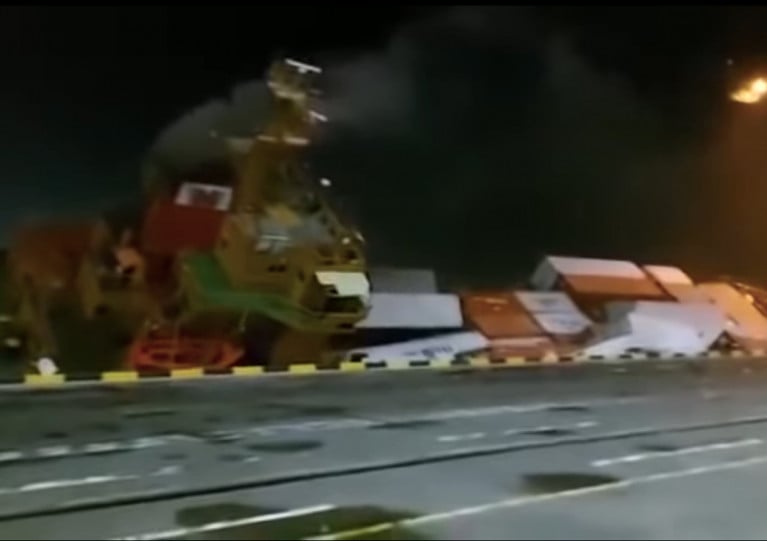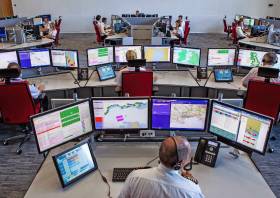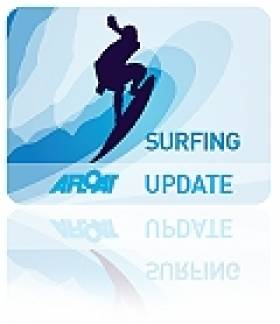Displaying items by tag: Indonesia
Video Captures Drama of Indonesian Container Ship Capsize
Dramatic footage has emerged of a container ship slowing sinking at a port in Indonesia over the weekend.
The video shows the cargo vessel Mentari Crystal capsizing alongside the pier at Teluk Lamong Terminal in the city of Surabaya — and taking with it its payload of 137 containers.
According to Marine Insight, all crew members were reported to be safe and unharmed by the incident, which is believed to have been caused by faulty ballasting that affected the ship’s stability.
Superyacht Sinking In Indonesia Sparks International Search Operation
HM Coastguard in the UK was among the agencies joining an international search operation last night (Friday 22 November) after a superyacht sank off Indonesia.
While initially believed to be a UK-registered vessel, it was quickly confirmed that the yacht, named Asia, was a Malaysian-registered sailing vessel with two British citizens among the four people aboard.
Following “extensive investigation work” by HM Coastguard, contact was made with the boat’s skipper at 5am this morning (Saturday 23 November).
He confirmed that the vessel sank after hitting an object in the water some 55 nautical miles off an Indonesian island, but all four crew had managed to get in board its RIB tender and were met by marine police at the nearest landfall.
“We are relieved to hear that the crew are now safely ashore,” said HM Coastguard Controller David Jones, who was in charge of co-ordinating efforts overnight.
“This incident demonstrated good international working between the UK Maritime Rescue Coordination Centre, JRCC Australia, JRCC Jakarta, USA Mission Control Centre and the UK Foreign and Commonwealth Office.”
South African Surfer Stranded In Shark-Ridden Seas
#Surfing - A South African surfer has survived a terrifying ordeal after being stranded alone in shark-infested waters in the Indian Ocean.
As Channel 4 News reports, 50-year-old Brett Archibald had been with friends on an overnight boat crossing from mainland Indonesia to the surfing grounds of the Mentawai Islands when he blacked out from seasickness and fell overboard in rough weather.
Unfortunately for Archibald, his friends were either asleep or suffering from seasickness themselves below deck, and several hours passed before he was noticed missing.
In the meantime, he was stranded alone in the water, surrounded by sharks and jellyfish and attacked by seagulls.
Archibald described his 28 hours adrift at sea as "insane" and said he nearly drowned eight times, but he continued to swim and tread water while, unbeknownst to him, rescue services were being mobilised for a large-scale search operation.
Channel 4 News has much more on the story HERE.
Dublin Port Company Trains Five Developing Countries
Representatives of Tanzania, the Maldives, Ghana, Indonesia and Malaysia have benefited from the experience of Ireland's largest and most successful port management company.
Dublin Port Company today announced it has completed a training programme for five developing countries as part of its UN-appointed role under UNCTAD's TrainForTrade programme.
Efficient maritime transport and port services are essential for creating sustainable economies in the developing world. The TrainforTrade programme helps ports in developing countries build better local economies by attracting and generating greater trade volumes using improved commercial handling practices learned from their training partner. In 2007, Dublin Port Company was chosen as the United Nation's partner to deliver training to ports in English-speaking countries in the developing world.
Representatives from the ports of Tanzania, the Maldives, Ghana, Indonesia and Malaysia, who have successfully completed their Train for Trade programme were today presented with their certificates by the Minister of State for Overseas Development, Mr. Peter Power TD, at a ceremony in Dáil Éireann.
Speaking at the presentation of certificates to course participants, Minister of State for Overseas Development, Mr. Peter Power, TD, said: “I congratulate Dublin Port Company on successful completion of UNCTAD’s TrainforTrade programme. Five ports in developing countries have benefited significantly from the skills and knowledge from Ireland’s largest and most successful port management company. This programme is important for improving trade in the developing world and driving economic growth.”
Responding to the Minister, Mr. Eamonn O'Reilly, Chief Executive, Dublin Port Company, said: "Dublin Port is proud to have been able to contribute to the UN's English-speaking pilot port training programme. We became involved in this initiative as part of our wider CSR programme and we hope that we have made a positive contribution and left a lasting legacy to help developing countries build stronger, more efficient ports for the future."
Dublin Port Company is a self-financing, private limited company wholly-owned by the State, whose business is to manage Dublin Port, Ireland's premier port. Established as a corporate entity in 1997, Dublin Port Company is responsible for the management, control, operation and development of the port. Dublin Port Company provides world-class facilities, services, accommodation and lands in the harbour for ships, goods and passengers.
Located in the heart of Dublin City, at the hub of the national road and rail network Dublin Port is a key strategic access point for Ireland and in particular the Dublin area. Dublin Port handles over two-thirds of containerised trade to and from Ireland and 50% of all Ireland's imports and exports, making it a significant facilitator of Ireland's economy. Dublin Port also handles over 1.5 million tourists through the ferry companies operating at the port and through cruise vessels calling to the port.
































































